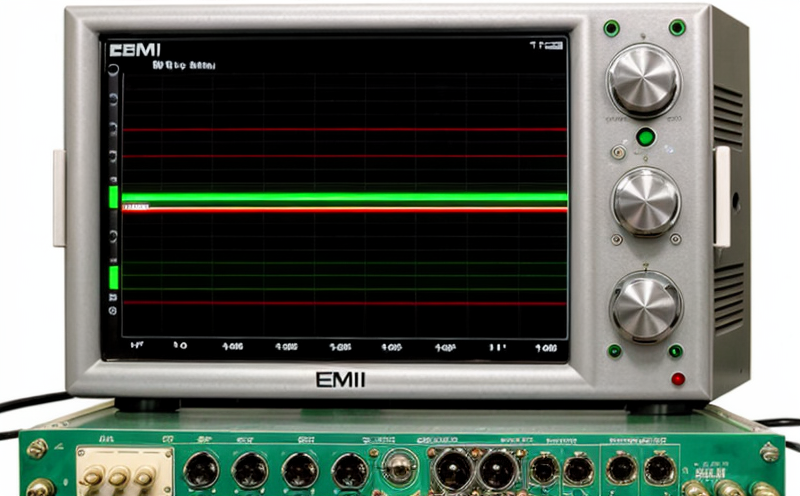
-
Electrical and Electromagnetic Testing-
Electromagnetic Interference Mitigation Testing-
EMI Testing in Multi-Frequency Communication Systems
We provide comprehensive solutions designed to help our clients mitigate risks, enhance performance, and excel in key areas such as quality, health & safety, environmental sustainability, and social responsibility.
Discover
For many years, our organization has been operating successfully, boasting modern laboratories that meet international standards. These laboratories are equipped with the latest technology devices and equipment, and we have built a strong team of experienced and trained personnel to operate them.
DiscoverWelcome to Eurolab, your partner in pioneering solutions that encompass every facet of life. We are committed to delivering comprehensive Assurance, Testing, Inspection, and Certification services, empowering our global clientele with the ultimate confidence in their products and processes.
Discover
-
Electrical and Electromagnetic Testing-
Electromagnetic Interference Mitigation Testing-
EMI Testing in Multi-Frequency Communication SystemsEMI Testing in Multi-Frequency Communication Systems
Electromagnetic Interference (EMI) testing has become a crucial aspect of ensuring the reliability and efficiency of multi-frequency communication systems. These systems, which operate on multiple frequencies to transmit and receive information, are increasingly being used in various applications such as wireless networks, radar systems, and satellite communications. However, with the increasing complexity and frequency range of these systems, EMI has become a significant concern.
EMI testing is essential to ensure that communication systems function correctly without interference from other devices or systems. The main goal of EMI testing is to measure the electromagnetic radiation emitted by a system and determine its potential impact on other systems operating in close proximity. In multi-frequency communication systems, EMI can cause degradation of signal quality, data loss, and even complete system failure.
Factors Affecting EMI Testing
There are several factors that affect EMI testing in multi-frequency communication systems:
Conducted immunity tests measure a devices susceptibility to electromagnetic interference via power or signal cables.
EMI testing is an essential aspect of ensuring the reliability and efficiency of multi-frequency communication systems. By understanding the factors affecting EMI, key considerations for system design, and best practices for testing, designers and manufacturers can create reliable and efficient systems that meet regulatory requirements while minimizing interference from other devices or systems.
QA: Additional Details on EMI Testing
Q: What are the main goals of EMI testing in multi-frequency communication systems?
A: The primary objectives of EMI testing are to ensure compliance with regulations, guarantee system performance, and prevent potential safety hazards.
Q: How do I determine which type of EMI test is most relevant for my system?
A: You can consult relevant regulatory documents or industry standards (e.g., FCC Part 15) to identify the specific tests required for your application.

Hospitality and Tourism Certification
Hospitality and Tourism Certification: Unlocking Opportunities in the Industry The hospitality and ...

Construction and Engineering Compliance
Construction and Engineering Compliance: Ensuring Safety, Quality, and Regulatory Adherence In the ...

Energy and Sustainability Standards
In today’s rapidly evolving world, businesses face increasing pressure to meet global energy a...

Healthcare and Medical Devices
The Evolution of Healthcare and Medical Devices: Trends, Innovations, and Challenges The healthcare...

Cosmetic Product Testing
The Complex World of Cosmetic Product Testing The cosmetics industry is a multi-billion-dollar ma...

Aviation and Aerospace Testing
Aviation and Aerospace Testing: Ensuring Safety and Efficiency The aviation and aerospace industr...

NEBS and Telecommunication Standards
Network Equipment Building System (NEBS) and Telecommunication Standards The Network Equipment Bu...

Environmental Simulation Testing
Environmental Simulation Testing: A Comprehensive Guide In todays world, where technology is rapidl...

Renewable Energy Testing and Standards
Renewable Energy Testing and Standards: Ensuring a Sustainable Future The world is rapidly transiti...

Lighting and Optical Device Testing
Lighting and Optical Device Testing: Ensuring Performance and Safety Lighting and optical devices a...

Pharmaceutical Compliance
Pharmaceutical compliance refers to the adherence of pharmaceutical companies and organizations to l...

Environmental Impact Assessment
Environmental Impact Assessment: A Comprehensive Guide Environmental Impact Assessment (EIA) is a c...

Pressure Vessels and Installations Testing
Pressure Vessels and Installations Testing Pressure vessels are a critical component of various ind...

Chemical Safety and Certification
Chemical safety and certification are critical in ensuring the safe management of products and proce...

Fire Safety and Prevention Standards
Fire Safety and Prevention Standards: Protecting Lives and Property Fire safety and prevention stan...

Agricultural Equipment Certification
Agricultural equipment certification is a process that ensures agricultural machinery meets specific...

Industrial Equipment Certification
Industrial equipment certification is a critical process that ensures industrial equipment meets spe...

Consumer Product Safety
Consumer Product Safety: Protecting Consumers from Harmful Products As a consumer, you have the rig...

Trade and Government Regulations
Trade and government regulations play a vital role in shaping the global economy. These regulations ...

Food Safety and Testing
Food Safety and Testing: Ensuring the Quality of Our Food As consumers, we expect our food to be sa...

Railway Industry Compliance
Railway Industry Compliance: Ensuring Safety and Efficiency The railway industry is a critical comp...

MDR Testing and Compliance
MDR Testing and Compliance: A Comprehensive Guide The Medical Device Regulation (MDR) is a comprehe...

IT and Data Center Certification
IT and Data Center Certification: Understanding the Importance and Benefits The field of Informatio...

Battery Testing and Safety
Battery Testing and Safety: A Comprehensive Guide As technology continues to advance, battery-power...

Transportation and Logistics Certification
Transportation and Logistics Certification: A Comprehensive Guide The transportation and logistics ...

Product and Retail Standards
Product and Retail Standards: Ensuring Quality and Safety for Consumers In todays competitive marke...

Military Equipment Standards
Military Equipment Standards: Ensuring Effectiveness and Safety The use of military equipment is a ...

Electrical and Electromagnetic Testing
Electrical and Electromagnetic Testing: A Comprehensive Guide Introduction Electrical and electrom...

Automotive Compliance and Certification
Automotive Compliance and Certification: Ensuring Safety and Efficiency The automotive industry is ...

Electromechanical Safety Certification
Electromechanical Safety Certification: Ensuring Compliance and Protecting Lives In todays intercon...